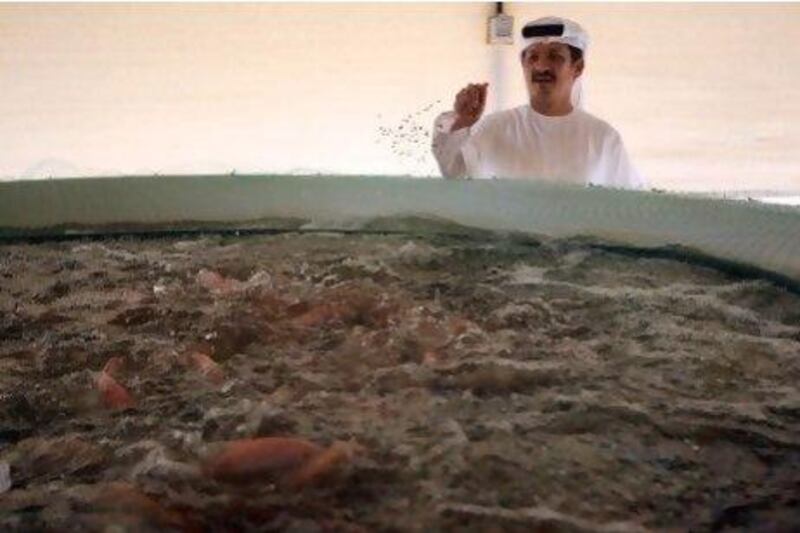ABU DHABI // A year after it was set up, the world's largest aquaponics centre has started to sell salad crops to supermarkets across the UAE and will market its fish in one year's time.
Set up with a grant from the Khalifa Fund, the Dh4 million project combines traditional fish farming with a system that uses their waste as fertiliser for hydroponic vegetable tanks.
The Baniyas centre, located in the Zayed Higher Agricultural Centre for Development and Rehabilitation in Abu Dhabi, has so far produced 10 tonnes of fish.
The centre has two 2,400-square metre greenhouses - one for fish, one for vegetables.
Between them is a series of tanks and filters that turn the ammonia-rich waste from the fish into food for the plants.
The project started last year with 10,000 tilapia fingerlings - juvenile fish - from Holland.
"The 10 tonnes of fish we produced in the past year will be reused in the system for the coming year before we can start selling it to the Abu Dhabi fish market," said Mohamed Al Areefi, the director of the centre.
"We plan on providing the market with fish twice a week, or 600 kilograms a month."
A similar set-up has been running for 11 years in the Virgin Islands.
The fish excreta is high in ammonia, which is toxic. But the filters and cleaning tanks contain nitrosomonas bacteria that convert the ammonia into nitrites, and nitrobacter bacteria that process the nitrite into nitrate. This can then be used as fertiliser.
And due to its automatic recirculating system, aquaponics does not need much monitoring or measuring. It also uses organic chemicals in its tanks to give the plants more taste.
The centre started trials at the end of May, growing tomatoes, lettuce, cucumbers and bell peppers using seeds from Holland, the US and Germany.
"We are planting the seeds now," said Mr Al Areefi. "In 21 days, we will get 60,000 heads of lettuce and the other produce will take around two months to grow."
Each crop is forecast to generate 10 tonnes of food in the next year.
Once fully grown, the produce will be sold to supermarkets across the UAE.
Of the trial crops already grown, the centre has sold up to 300kg of lettuce twice a week to supermarkets including Carrefour, Union Coop and the organic company Ripe in Dubai.
"In total, we sold a tonne of lettuce at Dh12 a piece from our trials," said Mr Al Areefi.
When fully operating, the centre should be able to produce up to 40 tonnes of produce and 12 tonnes of fish.
"We should be able to produce at least 52 tonnes of food by next year," said Mr Al Areefi.
The system, set up by JBA Agritech, uses water more efficiently than a conventional system. Its tanks contain 400,000 litres of water, which can be used for a year or two before it needs to be replaced.
Even the energy is expected to go green in the future, as the centre has plans to use sun and wind power to operate the system's pumps.
Mr Al Areefi is hoping for government support as many farmers have expressed interest in the technology.
"I hope this year, once it is complete, that the Government will subsidise it so people can replicate it," he said.
"It's a step towards helping the UAE's future food supplies."






